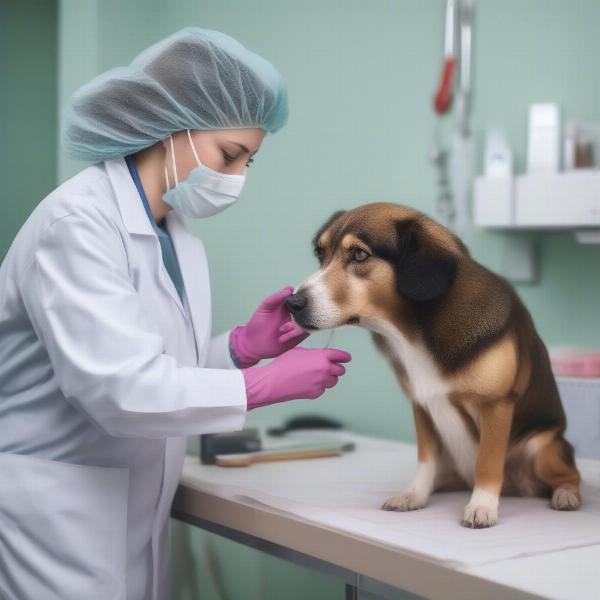Flea treatment for dogs at the vet offers a range of safe and effective options to combat these pesky parasites. This article will delve into the various flea treatments available at your veterinarian’s office, discussing their benefits, potential side effects, and how to choose the best option for your furry friend. From topical solutions to oral medications, we’ll cover everything you need to know to make an informed decision and keep your dog flea-free.
Understanding the Importance of Veterinary Flea Treatment
Fleas aren’t just annoying; they can cause significant health problems for your dog, including skin irritation, allergies, and even the transmission of diseases. Veterinary flea treatments are specifically formulated to be safe and effective for dogs, offering a higher level of protection and targeted treatment compared to over-the-counter options. Your vet can assess your dog’s individual needs, considering factors like age, breed, health conditions, and lifestyle, to recommend the most appropriate flea treatment.
 Veterinarian examining a dog for fleas
Veterinarian examining a dog for fleas
Types of Flea Treatment Available at the Vet
Veterinary flea treatments come in various forms, each with its own advantages and disadvantages. Some common types include:
- Topical Solutions: These are applied directly to your dog’s skin, typically on the back of the neck. They work by spreading through the coat and killing fleas on contact.
- Oral Medications: These are pills or chewable tablets that work systemically, killing fleas through your dog’s bloodstream.
- Flea Collars: These collars release insecticide over time, providing continuous protection against fleas.
- Injections: In some cases, your vet may administer an injection for rapid flea control, especially for severe infestations.
Choosing the Right Flea Treatment for Your Dog
The best flea treatment for your dog will depend on several factors, including:
- Age and Breed: Some treatments are not suitable for puppies or certain breeds.
- Health Conditions: If your dog has any underlying health issues, your vet will recommend a treatment that is safe for them.
- Lifestyle: A dog that swims frequently may need a waterproof treatment.
- Severity of Infestation: For severe infestations, a more aggressive treatment approach may be necessary.
What to Expect During a Vet Visit for Flea Treatment
Your vet will typically perform a physical exam to assess the severity of the flea infestation and check for any other health concerns. They will then discuss the available treatment options and help you choose the most appropriate one for your dog. Be sure to ask your vet any questions you may have about the treatment, including potential side effects and how to administer it correctly.
Preventing Future Flea Infestations
While veterinary flea treatments are effective, prevention is always better than cure. Regularly vacuuming your home, washing your dog’s bedding, and using flea preventatives year-round can help minimize the risk of future infestations. Your vet can advise on the best preventative measures for your dog’s specific needs.
Conclusion
Choosing the right flea treatment for dogs at the vet is crucial for their health and well-being. By understanding the various options available and consulting with your veterinarian, you can ensure your furry friend stays happy, healthy, and flea-free.
FAQ
- How often should I treat my dog for fleas? This depends on the specific treatment and your dog’s individual needs. Your vet will recommend a treatment schedule.
- Are there any side effects of flea treatments? Some dogs may experience mild side effects, such as temporary skin irritation or gastrointestinal upset.
- Can I use over-the-counter flea treatments instead? Over-the-counter treatments may not be as effective or safe as veterinary-prescribed options.
- What if my dog is still itching after treatment? It’s important to consult with your vet if your dog continues to experience itching, as this could indicate an underlying allergy or other issue.
- How can I prevent fleas in my home? Regular cleaning, vacuuming, and washing pet bedding can help prevent flea infestations.
- Can fleas transmit diseases to humans? Yes, fleas can transmit diseases to both animals and humans.
- Are there any natural flea remedies? While some natural remedies may offer some relief, they are often not as effective as veterinary-prescribed treatments.
ILM Dog is your trusted resource for expert advice on all aspects of dog care, including breed selection, health, training, nutrition, grooming, and more. We offer valuable insights and practical tips to help you provide the best possible care for your canine companion. For more information on dog health and care, visit our website ILM Dog or contact us via email at [email protected] or by phone at +44 20-3965-8624. We are here to help you and your dog live a happy and healthy life together!